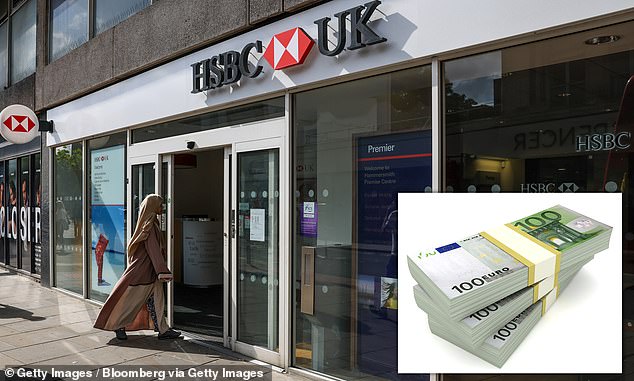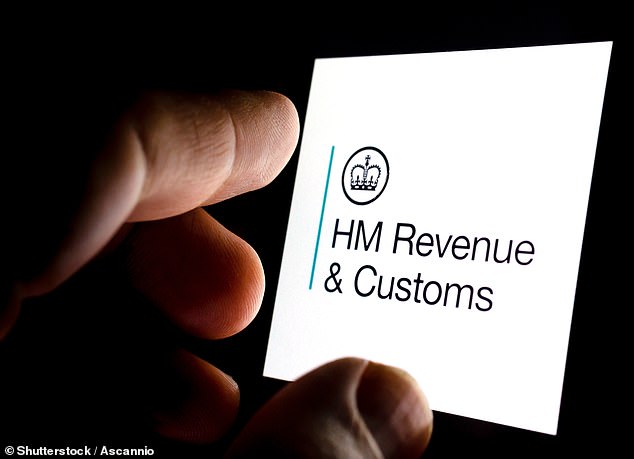TONY HETHERINGTON: HSBC bank reference error cost £7,600
>
Tony Hetherington is Financial Mail on Sunday’s chief investigator. He battles the reader’s corner, reveals the truth that lies behind closed doors, and wins victories for those left out of pocket. Below you can read how to contact him.
MH writes: I asked HSBC to transfer €200,000 (approximately £178,000) from my account to the account of currency broker Moneycorp at Barclays.
I wanted to take advantage of favorable exchange rates and invest the proceeds in pound sterling in a five-year bond with a fixed interest rate of about 5 percent.
HSBC made the transfer but omitted a necessary reference and the funds are still missing.

Reimbursement: Banking giant HSBC compensated for the loss and acknowledged responsibility
Tony Hetherington replies: Even before I intervened, HSBC was outspoken with you and admitted responsibility. You gave me a copy of the debit notice from the bank that holds the transfer, and the space for a reference is just blank. This meant that Barclays did not know what to do with the money when it arrived.
Two days after I contacted HSBC, the missing euros were tracked down and Barclays reversed the transfer. But by then, the exchange rate had moved against you and you had also lost the opportunity to invest in the bond you chose. All in all, your savings were on the missing list for 54 days due to an error by HSBC. During this time, the exchange rate fluctuated between about €1.12 and €1.17 to the pound, making a huge difference to the value in sterling.
HSBC told me: ‘Due to human error, the required reference was not included in the transaction leaving Mr H’s HSBC UK account, meaning it was not received as it should have been by Barclays.’ HSBC assured me that it would “absolutely ensure” that you were not short of money due to exchange rate fluctuations, and that it would also compensate you and possibly make up lost interest.
The bank has been as good as its word. HSBC has deposited £8,786 into your account. This includes over £6,000 to make up exchange losses, over £1,600 for lost interest and a further £1,000 as a goodwill payment to apologize for the original mistake.
You have confirmed that the payment has arrived – and of course the original missing Euros.
Tax deduction is missing
Mrs VH writes: I have instructed Tax Reclaim PPI Limited to reclaim tax paid when I received a payment protection insurance refund. This was fine, and as expected it took a part.
I have since received a letter from the tax authorities and customs stating that I still have to pay a discount, but it will be paid back to the agent.
I called the IRS and was told that I had appointed the company to receive all tax credits due, whatever the reason, and if I wanted to withdraw this I would have to get the company to tell the taxpayer myself.


The tax office said that Tax Reclaim PPI Limited had been appointed to receive all tax credits due
Tony Hetherington replies: Looking more closely at the emails and letters you’ve received, I found that the tax office had actually told you that your last £197 refund would go to Tax Reclaim Now Limited – a company you’ve never heard of. The IRS has refused to discuss this, so I suspect the letter and naming of this agent is simply wrong.
However, you really should have paid another PPI refund and it was sent to the correct agent, Tax Reclaim PPI, and the amount owed was charged to you. Over the past six months, the IRS and Customs have been reviewing regulations that have allowed agents to veto taxpayers’ desire to take over management of their own tax affairs. A few days ago, Revenue HQ announced it would be changing the rules to return control to taxpayers.
Everything clear? Cruiseclaim has been anything but
Ms. GM writes: We booked a cruise to the North Cape and took out travel insurance with Allclear. This cost £1,400 as my husband has had cancer surgery in 2021.
Unfortunately he suffered a minor TIA (transient ischemic attack) two weeks before the cruise and was told not to travel.
We filed a claim, and Allclear advertises that it will fulfill claims within five business days, but when we called two weeks later, we were told there was a 31-day backlog.


Withdrawn: Norwegian cruise to the North Cape was struck by illness
Tony Hetherington replies: Allclear told me its advertising claim is “based on non-aid claims approved for payment between November 2021 and March 2022 on Allclear branded policies only. The five-day working window begins when insurers have received all relevant information and documentation to confirm claims coverage.”
I did not press this point further as Allclear then told me it had already settled the claim and paid out over £5,000. But it added that your husband had made a mistake with the bank account information, so the money was lost. This got very confusing. Allclear asked you for your account details, but still deposited the money into your husband’s account.
After much research, the explanation seems to be that your husband started filing an online claim, but declined, and you and he then filed a paper claim – but when Allclear answered the paper claim, it took the bank details from the original online claim. In addition to fulfilling the claim, Allclear has paid you £300 to make up for all this.
If you believe you have been the victim of financial misconduct, write to Tony Hetherington at Financial Mail, 2 Derry Street, London W8 5TS or email tony.hetherington@mailonsunday.co.uk. Due to the large number of questions, no personal answers can be given. Only send copies of original documents, which unfortunately cannot be returned.
Some links in this article may be affiliate links. If you click on it, we may earn a small commission. That helps us fund This Is Money and use it for free. We do not write articles to promote products. We do not allow any commercial relationship to compromise our editorial independence.
